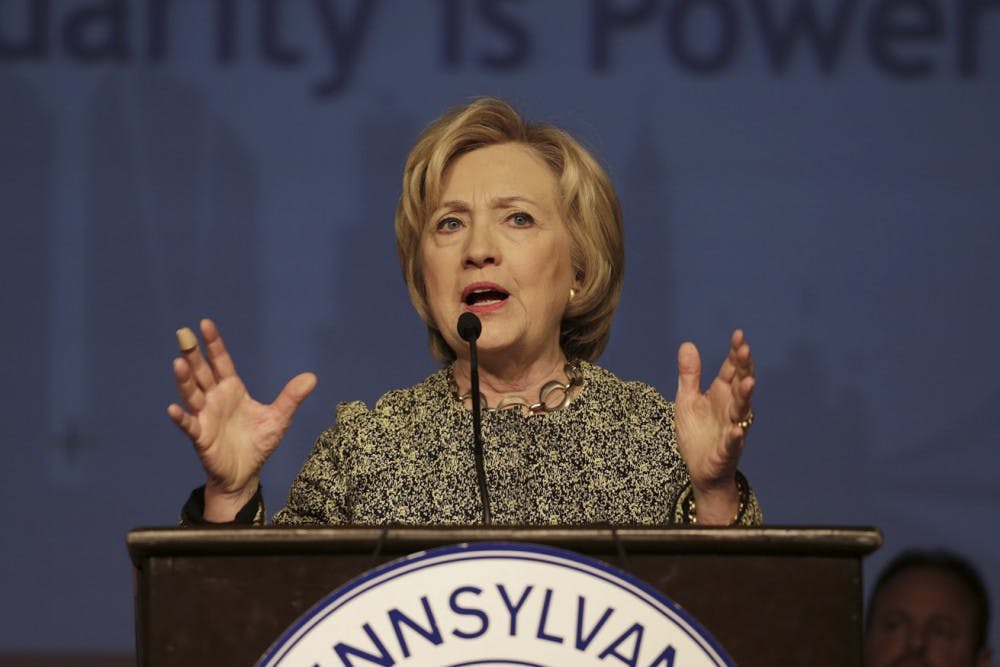
On April 6, Democratic presidential candidate Hillary Clinton spoke with members of Pennsylvania's AFL-CIO chapter about her plans to raise wages and protect American jobs | Olly Liu
Credit: Olly LiuFormer Secretary of State and Democratic presidential candidate Hillary Clinton addressed delegates of Pennsylvania’s American Federation of Labor and Congress of Industrial Organizations in Philadelphia on Wednesday.
Clinton, fresh off of a loss to Sen. Bernie Sanders (I-Vt.) in the Wisconsin primary on Tuesday, discussed issues of interest to AFL-CIO members. The candidate shared her plans for increasing wages, ensuring equal pay, protecting American jobs and increasing unions’ bargaining power.
“I think it’s pretty clear,” Clinton said to the unionists congregated at the Sheraton Hotel’s Liberty Ballroom. “Unions helped build the greatest middle class in the history of the world. When unions are strong, wages go up.”
Clinton visited Pennsylvania ahead of the April 26 state primary, which is shaping up to be an important contest for both Democratic candidates. Four other states will also be at play that day. The most recent poll, released by Quinnipiac University on Wednesday, shows Clinton leading Sanders 50 to 44 points among likely primary voters in the Keystone State.
The candidate focused part of her remarks around relevant state topics. She mentioned having watched Villanova University’s basketball team win the men’s NCAA National Championship on Monday to the delight of the audience. Clinton also commended Gov. Tom Wolf’s efforts to increase the minimum wage in Pennsylvania and mentioned the importance of protecting the state’s steel industry.
“China and other countries have been dumping artificially cheap steel here in our country,” she said. “American steel workers pay the price ... it is a crucial part of our manufacturing base.”
Clinton’s talk at the AFL-CIO convention highlights her success at fundraising from the Democratic elite donor base, in contrast to Sanders’ struggle with this. As of March 21, the labor sector’s contribution to Clinton’s campaign totaled an overwhelming $10,683,514 as compared to Sanders’ $84,324, according to the nonpartisan research group Center for Responsive Politics.
Sanders has been able to orchestrate a deep individual-donor base which, through small contributions, has allowed him to amass an estimated $139.8 million in campaign donations as of April 6. Clinton’s direct campaign contributions total $159.9 million.
Clinton briefly mentioned her Democratic rival at the convention, saying Sanders and she had “real differences about how we would go achieving our goals.” She also criticized his ability to pass viable bills in Congress.
Sanders is currently on a winning streak, having won six out of the seven contested states since March 22. Most recently, the senator won the Wisconsin primary on Tuesday with 56.6 percent of the vote. Sanders’ small momentum has allowed the self-proclaimed democratic socialist to reduce Clinton’s lead as the candidates prepare to battle out New York’s delegates on April 19.
According to an April 6 New York Times article, both Democrats will be focusing their campaign efforts in the coming weeks on New York, the state Clinton represented as a senator and where Sanders was born.
“When unions are weak and workers lose their voice and their bargaining power incomes stagnate, inequality grows and families suffer,” said Clinton, who promised the attendees that the labor movement would have a champion in the White House and a seat at the table if she were to be elected president.
The Daily Pennsylvanian is an independent, student-run newspaper. Please consider making a donation to support the coverage that shapes the University. Your generosity ensures a future of strong journalism at Penn.
DonatePlease note All comments are eligible for publication in The Daily Pennsylvanian.







